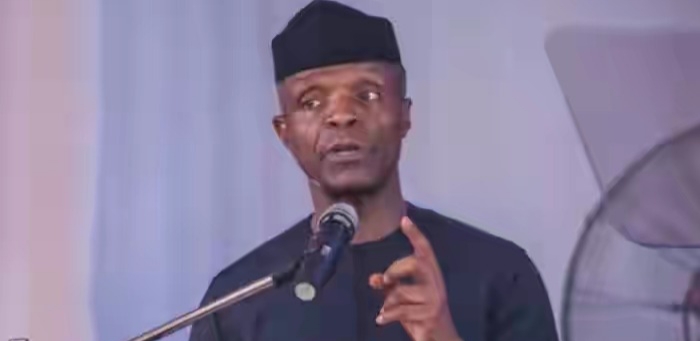Professor Yemi Osinbajo, Nigeria’s vice president on Saturday has expansiated the 2021 appropriations, saying the Federal Government would finance the budget with concessionary loans instead of commercial facilities.
While ruling out the possibility of patronising Eurobond, Osinbajo said concessionary loans attract between 1.5% and 2%, and have a longer tenor than commercial loans.
Osinbajo, who fielded questions from some editors at the Presidential Villa, described borrowing as an important part of financing budget, saying that economic growth would be difficult for Nigeria if the government did not borrow to develop infrastructure and create jobs.
He hinted that the government would sell some assets, including three power plants – Afam III, Aba Electricity Distribution Company and Yola Electricity Distribution Company.
The process for the sale of Yola Distribution Company has already been concluded.
Osinbajo also unfolded plans by the government to build 300,000 houses within 12 months as part of the Economic Sustainability Plan (ESP) of the Buhari administration.
He said the Petroleum Industry Bill (PIB) would determine the fate of the Nigerian National Petroleum Corporation (NNPC).
On the government’s plans to stimulate the economy, especially with the 2021 budget, the Vice President said: “Borrowing is an important part of financing budget. It is not particularly bad.
“An individual will say cut your coat according to your size. But for a nation, you are looking at more of cutting your coat according to your vision.
“You must have a vision, but between your vision and resources, there will always be a gap. So, there will always be a need to borrow.
“The main issue is: are you borrowing for what purpose? In this government, a lot of the foreign borrowing has been focused on infrastructure. All of this is to build an economy not only for today but for the future.
“When we borrow for infrastructure, we create jobs and opportunities immediately. The moment you begin to invest in infrastructure, you create jobs.
“We are not likely to explore the Eurobond market; we are looking at concessionary financing which has an interest rate of 1.5% to 2% or even less. For 2021, we are looking at concessionary financing.”
He said the planned sale of some plants was part of the sustenance of the nation’s privatisation policy.
“There are three assets of the NIPP being considered for sale. We started considering three plants but that process was truncated by developments between 2018 and 2019,” he said.
He added: “We intend to look at all possible revenue generation sources but sale of assets is not a priority.”
Concerning the ESP, Osinbajo said: “I think there is wide variety of measures to stimulate the economy.
“The whole point of ESP is to get as many people back to work. We also want to make sure we use local resources. That is the only way to stimulate the economy.”
On the Mass Housing Scheme, Osinbajo said: “A part of the N2.3 trillion for ESP has been dedicated to low-cost housing. We have asked state governments to give us land free. We are building houses that will not exceed the value of N2 million.
“We are building 300,000 houses in 12 months. It is a very aggressive target, but we are hopeful of getting it done.
“We have about 12 states that have given us land. We insist on locally produced materials such that each site will be a place where people are producing.”
Asked about the proposed unbundling of NNPC, Osinbajo said: “We are all awaiting the PIB. It will determine what will be the right approach.”
N19.3bn earmarked as security votes for DSS, NIA, NSA, others
The Federal Government plans to spend the sum of 19,316,524,954 as security votes in 2021.
The said sum will be shared by the office of the National Security Adviser (NSA) which is expected to receive 5,400,000,000; the Defence Intelligence Agency (DIA) N4, 370, 510,916; and the Nigerian Army N4, 187,780,938.
In the budget, security votes are captured under recurrent items, meaning that the allocations will not likely be tampered with by the National Assembly during the budget review.
Others who will also get direct security votes from the budget are the Department of State Services (DSS), 1,800,000,000; Ministry of Defence (MOF), 1,520,000,000; Nigeria Air Force, 1,204,099,768; Nigeria Navy, 520,000,000; Defence Headquarters, 200,000,000 and Nigeria Intelligence Agency (NIA), 114,133,332.
Apart from these security votes in the budget, the federal government has offered to spend a lot of money on internal security in the new year, according to the budget breakdown released on Friday by the Budget Office of the Federation (BoF).
The Presidential Air Fleet (PAF) will not be buying new aircraft for the Presidency in 2021, but will engage in upgrades and repairs of old presidential air fleets.
In 2021, the PAF will carry out mandatory upgrade and installation of live TV and internet service on BBJ (5N-FGT) at a cost of 630,000,000; purchase new AW 139 helicopter gearbox at 1,650,020,000; comply with the mandatory upgrade on PAF aircraft at 1,800,000,000.
The PAF plans to overhaul the President’s Gulfstream G550, Falcon 7X and CL605 aircraft engines at a cost of 2,400,000,000 and overhaul the President’s Challenger 605 and Hawker 4000 aircraft landing gears at 1,100,543,000.
On the part of the armed forces and the supervising Ministry of Defence (MOD) Headquarters, the ministry will spend 189,367,410 on anti-personnel landmine demining in contaminated areas in the North East.
The ministry will also spend another 23,168,132 on verification/valuation for compensation of lands acquired by the Armed Forces of Nigeria; 50,000,000 on Armed Forces Remembrance Day Celebration and 45,000,000 to renovate three cemeteries in three geo-political zones.
